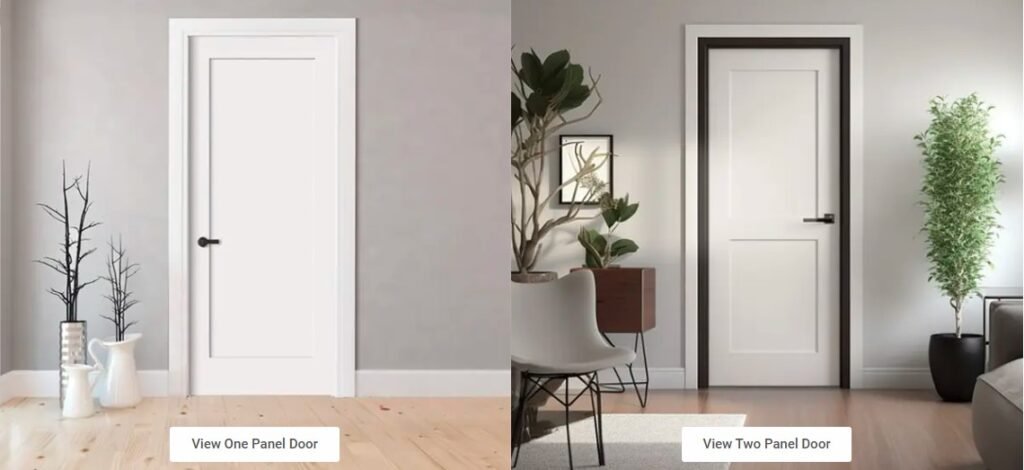When choosing interior doors for your home or office, two popular options are solid core interior doors and frosted glass doors. Each type offers distinct advantages in terms of durability, privacy, aesthetics, and functionality. This blog will explore the features, benefits, and ideal applications of both door types to help you make an informed decision.
1. Understanding Solid Core Interior Doors
What Are Solid Core Interior Doors?
Solid core interior doors are constructed with a dense inner core, typically made of wood composite, particleboard, or fiberglass, and covered with a veneer or laminate finish. Unlike hollow-core doors, they provide better sound insulation, durability, and a premium feel.
Key Features of Solid Core Doors
-
Durability: Resistant to dents and warping, making them ideal for high-traffic areas.
-
Sound Insulation: The dense core reduces noise transfer between rooms.
-
Security & Privacy: Offers better privacy due to their solid construction.
-
Aesthetic Appeal: Available in various finishes (wood grain, painted, laminate) to match interior décor.
-
Fire Resistance: Some models come with fire-rated cores for enhanced safety.
Ideal Applications for Solid Core Doors
-
Bedrooms & Home Offices: For noise reduction and privacy.
-
Entryways & Hallways: Where durability is essential.
-
Commercial Spaces: Offices, conference rooms, and hotels.
Pros & Cons of Solid Core Doors
✅ Pros:
-
Excellent soundproofing
-
Sturdy and long-lasting
-
Better insulation against temperature changes
-
More secure than hollow-core alternatives
❌ Cons:
-
Heavier, requiring stronger hinges
-
More expensive than hollow-core doors
-
Limited design flexibility compared to glass doors
2. Exploring Frosted Glass Doors
What Are Frosted Glass Doors?
Frosted glass doors feature glass panels that have been treated (sandblasted, acid-etched, or laminated) to create a translucent, semi-opaque appearance. They allow light to pass through while providing privacy.
Key Features of Frosted Glass Doors
-
Light Transmission: Brightens interior spaces by allowing natural light flow.
-
Modern Aesthetic: Sleek and contemporary, ideal for minimalist and modern designs.
-
Privacy Options: Frosting levels vary—light frosting offers visibility, while heavy frosting ensures full privacy.
-
Customization: Can be paired with frames made of wood, aluminum, or steel.
Ideal Applications for Frosted Glass Doors
-
Bathrooms & Showers: Provides privacy without blocking light.
-
Office Partitions: Enhances an open yet private workspace.
-
Closet Doors & Room Dividers: Adds elegance while maintaining visibility.
-
Retail & Restaurants: Creates a stylish, inviting atmosphere.
Pros & Cons of Frosted Glass Doors
✅ Pros:
-
Enhances natural lighting
-
Modern and stylish appearance
-
Customizable with patterns and designs
-
Easier to clean (compared to textured wood)
❌ Cons:
-
Less soundproof than solid core doors
-
Can be more fragile (risk of cracking)
-
Higher cost for tempered or custom glass
-
Limited insulation properties
3. Solid Core vs. Frosted Glass Doors: Key Differences
| Feature | Solid Core Doors | Frosted Glass Doors |
|---|---|---|
| Privacy | High (fully opaque) | Moderate (semi-translucent) |
| Sound Insulation | Excellent | Minimal to moderate |
| Durability | Very durable | Less impact-resistant |
| Light Transmission | Blocks light | Allows light diffusion |
| Maintenance | Easy to repaint/refinish | Requires regular cleaning |
| Cost | Mid to high range | Varies (standard to premium) |
| Best For | Bedrooms, offices, noise-sensitive areas | Bathrooms, modern interiors, spaces needing light |
4. Which One Should You Choose?
When to Choose a Solid Core Door
-
You need soundproofing (e.g., bedrooms, home offices).
-
You prefer maximum privacy and security.
-
Your priority is durability and insulation.
When to Choose a Frosted Glass Door
-
You want natural light flow in darker spaces.
-
You prefer a modern, elegant aesthetic.
-
The door is for a bathroom, closet, or office partition.
Hybrid Option: Solid Core Doors with Glass Inserts
If you want the best of both worlds, consider a solid core door with frosted glass inserts. This combines durability, sound insulation, and stylish light diffusion.
5. Installation & Maintenance Tips
Solid Core Doors
-
Use heavy-duty hinges (at least 3-4 per door).
-
Ensure proper alignment during installation to prevent warping.
-
Repaint or refinish as needed to maintain appearance.
Frosted Glass Doors
-
Opt for tempered or laminated glass for safety.
-
Clean with non-abrasive glass cleaners to avoid scratches.
-
Consider frosted film as a budget-friendly alternative to etched glass.
6. Final Thoughts
Both solid core interior doors and frosted glass doors have unique advantages. If privacy, durability, and noise reduction are your priorities, solid core is the best choice. However, if you want a bright, modern look with light diffusion, frosted glass doors are ideal.
For a balanced approach, explore hybrid designs or use each type where they perform best—solid core for private rooms and frosted glass for areas needing light and style.
Need Help Choosing?
Consult with an interior designer or door specialist to find the perfect fit for your space!







